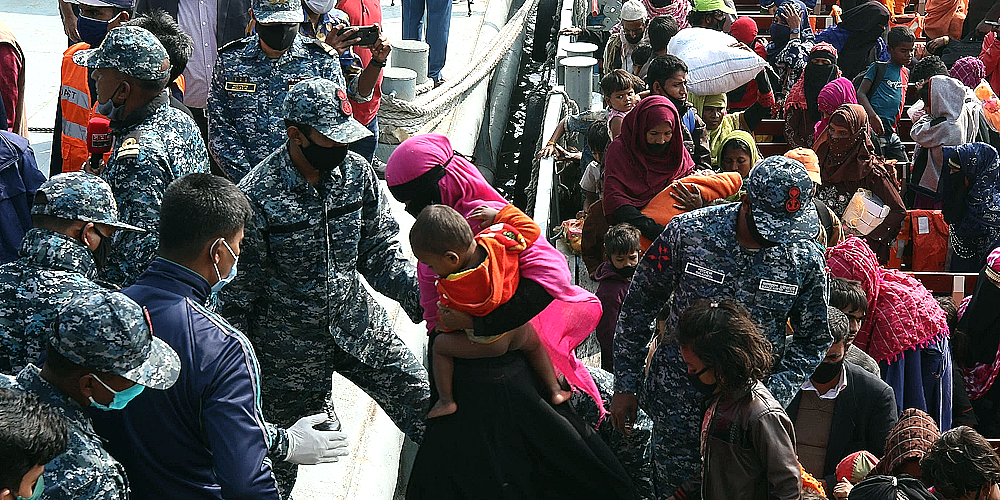
The decision to make this treacherous journey is driven by the numerous challenges we face in refugee camps
The hardships of our lives have compelled many Rohingya to make the difficult choice to migrate to different destinations.
Since 2012, many amongst us have migrated to Malaysia via an irregular route encompassing Myanmar’s mountains, the sea, and the Thai border.
Despite the high number of detentions and people going missing in Myanmar and Thailand in this process, the refugees continue to knowingly opt for this path.
Meanwhile, human trafficking remains rampant in camps.
The decision to make this treacherous journey is driven by the numerous challenges we face in refugee camps, including lack of basic security, limited access to higher education, and delays in repatriation.
My friend Mohammad Younus left on one of these boats in April. When I asked him why, he said, “I am not happy in the Bangladesh refugee camp. We were stuck there with unbearable problems and a difficult life. There seems to be no likely end to that. We do not have a tomorrow.”
Most of us are losing hope of returning to Myanmar because proper steps are not being taken on the Rohingya’s behalf by the international community.
Meanwhile, it has been six years since Rohingya youth were supposed to receive higher education in Bangladesh or abroad through a global refugee education mechanism.
But even now, due to multiple government restrictions, no such opportunities exist for the refugees, and nor have they been given permission to go abroad for their studies.
The average resident of a Rohingya refugee camp will say that the camp has an environment that is too hostile and toxic these days for them to live and breathe as humans.
We are deeply impacted by gang violence and the insecurity of life in the camp, and that too after already suffering several decades of persecution in Myanmar.
Risk of death is a daily fear. No day or night passes without news of people being killed or kidnapped.
As Younus highlighted, “It’s not an easy choice to risk my life to study and cross the border illegally in search of education.
“If I can return to our homeland, I might start studying again there, but it is futile to expect our repatriation now or in the future because Myanmar’s situation is not improving in any way.
“We are completely uncertain as to how long we will have to stay in Bangladesh.”
The average resident of a Rohingya refugee camp will say that the camp has an environment that is too hostile and toxic these days for them to live and breathe as humans.
We are deeply impacted by gang violence and the insecurity of life in the camp, and that too after already suffering several decades of persecution in Myanmar.
Risk of death is a daily fear. No day or night passes without news of people being killed or kidnapped.
Anything can happen at any moment in what is a free market of exploitation. Additionally, the refugees’ movement is highly restricted at all times.
As a result, the majority of Rohingya are in mentally unstable and fearful states.
We constantly have to look for ways to hide ourselves from different gangs and constantly feel lost and vulnerable.
As Younus put it, “Since last year, we are unable to sleep peacefully and it is hard to stay calm due to the general fearful atmosphere and daily murder incidents.”
Many people are sick of statelessness. Almost all of us think that we do not have a life or a future.
We feel like prisoners, with the camp being a lifelong prison that offers no decent livelihood, scope for development, or justice.
“We are under an unofficial curfew and are regularly interrogated, threatened, extorted, and kidnapped inside the camps,” Younus mentioned.
He explained that the Rohingya were called kala (illegal migrants) by Buddhist people in Myanmar, but now they are always being called “shalar Rohingya” (damned Rohingya) by Bangladeshi locals.
Younus explained, “Being a refugee is not our choice, but our circumstances turned us into stateless refugees. We, the common refugees, should not be punished due to the crimes of gangs or others.
“We have almost been forgotten and left out by the world. That’s why we opt for risky migration.
“After all, every person harbours the dream to settle down as a good person and earn decent qualifications.”
The international community’s attention became occupied when the war in Ukraine broke out. But six years on, no effective actions have been taken against the military perpetrators or to send the Rohingya back to Myanmar.
Meanwhile, Bangladesh is also failing to protect the Rohingya from violence or offer them the opportunity to be properly educated. We are living like fish out of water.
The world must not forget the Rohingya. It must call for the end of the Rohingya crisis and repatriate them safely.
ADVERTISEMENT
ADVERTISEMENT








































